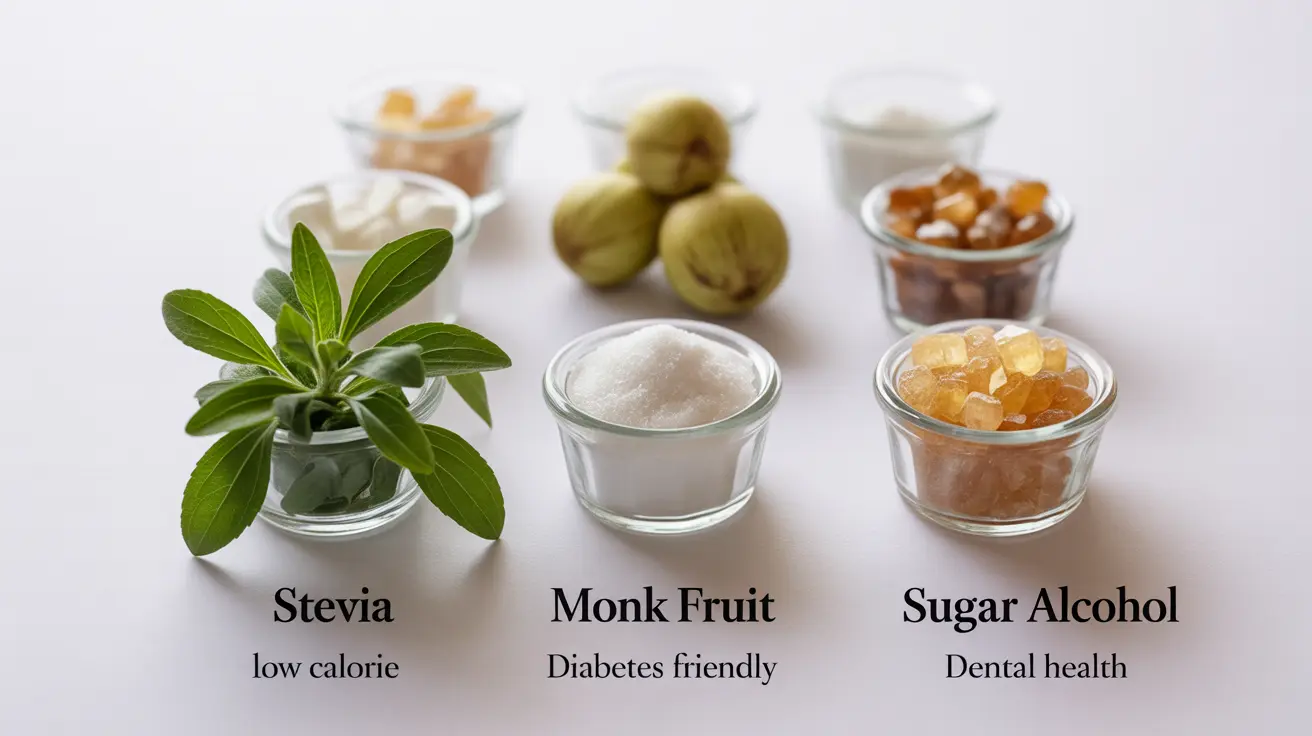As more people become health-conscious and seek ways to reduce their refined sugar intake, natural sugar alternatives have gained significant attention. These substitutes offer ways to satisfy sweet cravings while potentially providing additional health benefits and fewer calories than traditional table sugar.
Understanding the various natural sugar alternatives available and their effects on health can help you make informed decisions about incorporating them into your diet. Let's explore the most popular options, their benefits, and how to use them effectively.
Common Natural Sugar Alternatives and Their Benefits
Several natural sweeteners offer unique advantages over refined sugar while maintaining satisfying sweetness. Here are some of the most beneficial options:
Stevia
Stevia is a zero-calorie sweetener derived from the leaves of the Stevia rebaudiana plant. It's significantly sweeter than regular sugar and doesn't impact blood glucose levels, making it particularly suitable for people with diabetes. Stevia also contains antioxidant compounds that may offer additional health benefits.
Monk Fruit
Monk fruit sweetener comes from the monk fruit, a small round fruit native to Southeast Asia. Like stevia, it contains zero calories and doesn't affect blood sugar levels. It's particularly notable for its clean, sweet taste without the bitter aftertaste some people experience with other alternatives.
Natural Sugar Alcohols
Erythritol and xylitol are sugar alcohols that occur naturally in fruits and vegetables. They provide fewer calories than sugar and have minimal impact on blood sugar levels. These alternatives also support dental health as they don't contribute to tooth decay.
How Natural Sweeteners Affect Your Health
Blood Sugar Management
Many natural sugar alternatives have minimal impact on blood glucose levels, making them excellent options for people with diabetes or those watching their blood sugar. They can help satisfy sweet cravings without causing the dramatic blood sugar spikes associated with regular sugar.
Weight Management Benefits
Natural sugar alternatives can be valuable tools for weight management as they typically contain fewer calories than regular sugar. When used as part of a balanced diet, they can help reduce overall caloric intake while maintaining the enjoyment of sweet foods.
Potential Side Effects
While natural sugar alternatives are generally safe, some people may experience digestive issues when consuming large amounts, particularly with sugar alcohols. It's important to introduce these alternatives gradually and pay attention to how your body responds.
Using Natural Sweeteners in Your Diet
Cooking and Baking
When using natural sugar alternatives in cooking and baking, remember that they often have different sweetness levels and may affect the texture of your final product. Start with small amounts and adjust according to taste and recipe requirements.
Portion Guidelines
While natural sweeteners may be healthier than refined sugar, moderation remains important. Focus on gradually reducing your overall preference for sweet tastes while using these alternatives as tools in your health journey.
Frequently Asked Questions
What are the healthiest natural sugar alternatives compared to regular sugar?
The healthiest natural sugar alternatives include stevia and monk fruit, as they contain zero calories and don't affect blood sugar levels. Other beneficial options include erythritol and xylitol, which have minimal caloric impact and additional dental health benefits.
How do natural sweeteners like stevia and monk fruit affect blood sugar levels?
Stevia and monk fruit have no significant impact on blood sugar levels because they don't contain carbohydrates and aren't metabolized like regular sugar. This makes them excellent choices for people with diabetes or those monitoring their blood glucose levels.
Are there any side effects or risks associated with consuming natural sugar substitutes?
While generally safe, some people may experience digestive issues when consuming large amounts of sugar alcohols. Stevia and monk fruit rarely cause side effects, but some individuals may notice a slight aftertaste. It's important to introduce any new sweetener gradually.
Can natural sugar alternatives help with weight management or diabetes control?
Yes, natural sugar alternatives can support weight management and diabetes control by providing sweetness without the calories or blood sugar impact of regular sugar. However, they should be used as part of an overall healthy diet and lifestyle approach.
How should I use natural sweeteners like honey, maple syrup, or coconut sugar in a balanced diet?
While these natural sweeteners contain more nutrients than refined sugar, they should still be used in moderation as they affect blood sugar levels. Use them thoughtfully in recipes, starting with small amounts, and consider them part of your overall daily sugar intake.




